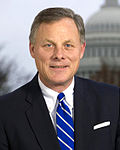| |||||||||||||||||
| |||||||||||||||||
Burr: 40–50% 50–60% 60–70% 70–80% 80–90% >90% Bowles: 40–50% 50–60% 60–70% 70–80% 80–90% >90% Tie: 40–50% | |||||||||||||||||
| |||||||||||||||||
| Elections in North Carolina |
|---|
 |
The 2004 United States Senate election in North Carolina was held on November 2, 2004. Incumbent Democratic U.S. Senator John Edwards decided to retire from the Senate after one term in order to run unsuccessfully for the 2004 Democratic Party presidential nomination, and become his party's vice presidential nominee. Republican Richard Burr won the open seat, making it the fifth consecutive election in which partisan control of the seat changed.



